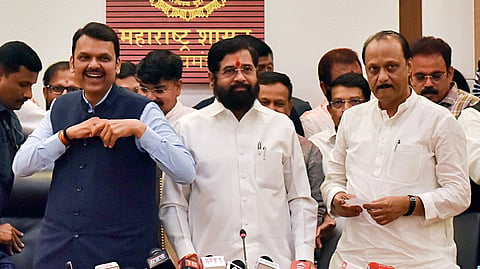Mahayuti's 100-day test: Only five of 37 departments clear the bar; CM Fadnavis' Home Ministry falls short
MUMBAI: In a telling reflection of administrative performance, only five out of Maharashtra’s 37 departments managed to meet the targets set under the Mahayuti government's ambitious 100-day programme. The initiative, launched by Chief Minister Devendra Fadnavis on January 7, 2024, and concluded on April 16, aimed to benchmark and enhance departmental performance across various sectors.
Surprisingly, the departments led by the top brass of the state—Chief Minister Devendra Fadnavis (Home), Deputy Chief Minister Eknath Shinde (Urban Development), and Deputy Chief Minister Ajit Pawar (Finance and Excise)—failed to make it to the list of top-performing ministries.
As per data released by the state government, only five departments achieved the desired performance threshold, marking a mere 12.5 per cent overall success rate for the government’s short-term initiative.
Leading the list was the Women and Child Development Department, under Nationalist Congress Party (NCP) minister Aditi Tatkare, which scored an impressive 80 per cent against the set benchmarks. The Public Works Department (PWD) followed closely with 77.95 per cent, while the Agriculture Department secured third place with 66.15 per cent. The Rural Development Department and the Transport and Ports Department completed the top five, scoring 63.85 per cent and 61.28 per cent respectively.
Agriculture Minister Manikrao Kokate hailed his department’s performance, crediting the adoption of innovative and AI-driven technologies in agriculture for the successful outcome.
“I am happy that my department ranked among the top five. This success is the result of a collective effort by our team in implementing farmer-centric policies. It now increases our responsibility to perform even better,” Kokate said.
Departments scoring below 40 per cent were deemed to have failed, as per the programme’s evaluation criteria. Sources revealed that the performance report has been circulated internally, and underperforming departments have been directed to review their functioning and improve outcomes.
An official from one such department, speaking on condition of anonymity, acknowledged the shortcomings. “It is true that we did not meet expectations. This experience is a learning curve, and we intend to rectify our course. However, we urge the state leadership to reconsider the frequent reshuffling of department secretaries, which adversely affects continuity and efficiency,” the official noted.
The 100-day performance programme was introduced with the dual aim of setting a baseline for governance and identifying systemic bottlenecks. However, the initial results appear to suggest a significant performance gap in key ministries, raising concerns about leadership efficacy and institutional stability within the state administration.

